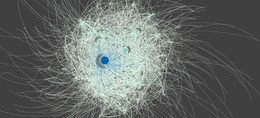Mirko Tobias Schäfer / Assistant Professor
University of Utrecht Department for Media and Culture Studies
Mirko Tobias Schäfer / Assistant Professor
University of Utrecht Department for Media and Culture Studies
Using digital media means creating 'digital' traces that can be employed for investigating how media are used, how users connect through online platforms, to what extent established media are intertwined with the emerging social media. In cooperation with NGO's, public administrations and companies, the Utrecht Data School investigates such data.
The Utrecht Data School answers to the growing interest of students to learn more about how to analyse the plethora of data that emerges online. Simultaneously the Utrecht Data School helps public administrations, NGO's and businesses to make sense of the data concerning their activities. Many organisations are unaware to what extent those data can help to understand debates, interaction with other parties and participation of users.
The first edition of the Utrecht Data School is integrated into the course Participatory Culture and New Media taught by Mirko Tobias Schäfer. The case studies, provided by the external partners, fit very well the overall objectives of the course to investigate the profound transformation of public sphere, socio-political debates and fragmented audiences in the age of connected media.
Partners of the first edition are the Ministerie Infrastructuur en Milieu (Ministry for Infrastructure and Environment), Unicef, Emma Communicatie, the PO Raad (Netherlands Board for Primary Education) and Utrecht University. As technology partner, Amsterdam-based media metrics analyst Buzzcapture provides support in data aggregation and further media analysis.
The assignments for student research revolve around the transformation of organisations in a knowledge economy and how technology and media practices allow improvements in knowledge organisation, information distribution and how to reach out to audiences and external partners. “Students have the unique opportunity to learn 'on the job' how to make sense of data, how to interpret and to contextualise them” says New Media & Digital Culture programme director Ann-Sophie Lehmann enthusiastically. “And we have the chance to teach them skills they will need in their carreers and provide them additionally with the critical mindset to question tools and data, which will be a key skill in the emerging information society.”
Besides the applied results of the case studies, the Utrecht Data School explicitly serves the implementation of digital humanities into the curriculum of new media research. Applying digital methods to the analysis of media phenomena affects traditional research methods in the humanities. While these methods are very helpful in gathering information, analysing data and presenting results, they also stimulate a critical thinking about the role of technology in epistemic processes.
Joost Raessens, who holds the chair of media theory at Utrecht University is enthusiastic about the new initiative: “Using new methods to analyse and understand the digital realm is very important for media departments. With the Utrecht Data School, we aim to structurally integrate the related key practices into our curriculum and simultaneously provide a platform for research activities.” This fits to the concerted efforts of the Department for Media and Culture Studies at Utrecht University to develop its Digital Humanities profile. The practices will be seamlessly integrated into research efforts on digital citizenship, game studies, media audiences and participatory culture. Revisiting critically the methods and tools used informs the study of epistemic cultures and the role of data visualizations in our knowledge economy.
The Dutch government has recently issued a policy for defined top sectors of the knowledge economy for intensified collaboration between the private sector and universities. Contrary to the formal processes of collaboration in that area, the Utrecht Data School is a bottom-up initiative that operates unbureaucratic, fast and it maintains a low threshold. “These are mainly student projects, which can be set up quickly and executed within ten weeks.” argues Thomas Boeschoten one of the initiators of the Utrecht Data School. “Our partners are interested in working with students, because they provide a fresh and open-minded view on the topics we investigate. They also bring in their distinct cultural knowledge about the digital world.” The partners appreciate the open brainstorm and hackathon sphere of the venture. For both, the students and the partners this platform bears many opportunities. Organisations can meet potential employees and the students receive an impression of potential careers and the expertise needed and expected there. The initiative emphasises that their activities do not compete with professionals in the field. “What we do is fundamentally different” says Mirko Tobias Schäfer. “We can afford to play with the data, to think from various approaches and to experiment with various tools and research questions. We help organisations to think broader about the quality of data they have and to formulate specific questions of research queries. We help them to think in general about their media practices and their position in a societal discourse. Eventually they can make a very informed decision on which (commercial) specialist to approach for specified analysis.”
Lisette van Blokland (project manager)
Thomas Boeschoten (instructor)
Dr. Mirko Tobias Schäfer (instructor)
Utrecht Data School is a research initiative at the New Media & Digital Culture Programme at Utrecht University: www.dataschool.nl
Illustration: Data visualization by Anouk Meerman
Date February 2013 Category News

Utrecht Data School is a research initiative for students to analyse and visualize data. Using data from social media platforms or analysing hyperlinks of websites reveals social interaction and patterns of communication.